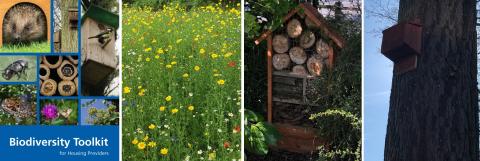Ecologists at the UK Centre for Ecology & Hydrology (UKCEH) have launched a ‘Biodiversity Toolkit’ to enable housing providers and residents support wildlife on their estates.
Connecting and interacting with nature has been shown to be important for people’s physical and mental health – this has been brought to the fore during the Covid-19 lockdowns.
The toolkit, which was developed by UKCEH in conjunction with Southern Housing Group and other partners*, provides a range of ways to improve biodiversity on housing estates. These options can be tailored according to housing density, budget available and the level of maintenance that would be possible.
Available at www.shgroup.org.uk/toolkit, the toolkit includes more than 20 wildlife management options suitable for housing developments. It also provides a guide on how best to improve green spaces for wildlife while involving residents in key decision making.
UKCEH hopes other housing providers across the UK will use the toolkit to make changes in management practices on their estates to provide much-needed habitats for wildlife and improve residents’ health and wellbeing.

Measures to encourage biodiversity such as wildflower meadows, bug hotels and bat boxes were introduced in Bracknell Pictures: John Vince
Jodey Peyton, UKCEH ecologist, said: “Urban development is one of the causes of habitat loss, deterioration and fragmentation of natural areas. This has led to significant declines in a wide range of animal and plant species, particularly over the past 50 years.
“Green spaces in urban habitats have great potential for supporting lots of wildlife and improving people’s wellbeing.
“Our new toolkit advises housing providers and residents on measures they can implement themselves, offering a range of affordable and achievable wildlife management options to help reverse the long-term decline in biodiversity in urban areas.”
A pilot scheme introducing some wildlife-friendly measures was carried out on a Southern Housing Group estate in Bracknell last year.
The variety of wildflowers was increased through both planting and by leaving a proportion of grassland unmown. Shelters for bees and other invertebrates, including so-called ‘bug hotels’, were distributed around the estate along with bird and bat nesting boxes on trees and buildings.
Patryk Szczerba, Southern Housing Group’s Sustainability Manager, said: “We were delighted to be involved with this project. As a business that develops land in both rural and urban settings we’re determined to encourage the return of wildlife to the built environment. It can be as simple as making a slightly different choice of plants for a hedgerow or grassy area. A commitment to biodiversity doesn’t need to come with high financial or human resource investment.”
UKCEH’s work on the toolkit was funded by the Natural Environment Research Council (NERC).
-Ends-
Notes to Editors
1. *The toolkit was developed by UKCEH, Southern Housing Group, Thames Valley Environmental Records Centre, Bracknell Forest Council, the Association of Local Environmental Records Centres, and the Berkshire, Buckinghamshire and Oxfordshire Wildlife Trust, with funding from NERC grant NE/S013989/1.
It has more than 20 wildlife management options to encourage growth of wildflowers, support pollinators and other insects, birds and mammals, plus promote sustainability. Suggested measures include:
- planting wildflowers, hedgerows, native trees and shrubs, as well as vegetable plots
- reduced mowing, reduced hedgerow cutting and retaining some scrub to create a mosaic of different habitats even in small spaces
- creating structures for insects to shelter in during winter, as well as bee nesting sites, hedgehog ‘houses’ and ‘highways’, ponds and rain gardens
- installing bat and bird boxes, compost bins and water butts
- reduced use of herbicides and pesticides
2. Different research studies have shown that daily contact with nature is associated with better health including reductions in obesity, stress levels and improved concentration, with significant improvements gained from just two hours’ exposure a week. Meanwhile, anecdotal evidence from the past year has shown that connecting with nature has improved people’s mental health, enabling them to better cope with the lockdown restrictions.
Engagement with the environment is promoted by Defra, in its 25 Year Environment Plan, and by Natural England, while improving people’s access to nature became part of London’s statutory planning process in 2004.
Media enquiries
For interviews and information, please contact Simon Williams, Media Relations Officer at UKCEH, via simwil@ceh.ac.uk or +44 (0)7920 295384. Images from the Bracknell project and a PDF of the toolkit are available in a Google Drive folder.
About the UK Centre for Ecology & Hydrology (UKCEH)
The UK Centre for Ecology & Hydrology is a centre for excellence in environmental science across water, land and air. Our 500 scientists work to understand the environment, how it sustains life and the human impact on it – so that together, people and nature can prosper.
We have a long history of investigating, monitoring and modelling environmental change, and our science makes a positive difference in the world. The issues our science addresses include: air pollution, biodiversity, biosecurity, chemical risks, extreme weather events, droughts, floods, greenhouse gas emissions, land use, soil health, sustainable agriculture, sustainable ecosystems, sustainable macronutrient use, and water resources management. The UK Centre for Ecology & Hydrology is a strategic delivery partner for the Natural Environment Research Council, part of UK Research and Innovation.
www.ceh.ac.uk / Twitter: @UK_CEH / LinkedIn: UK Centre for Ecology & Hydrology
About Southern Housing Group
Southern Housing Group was established in 1901 and has grown to become one of the largest housing associations in the south of England. We manage more than 30,000 homes and work with more than 40 local authorities; providing homes to over 72,000 residents. We employ around 1,000 people and offer a range of housing options for rent and sale and undertake a wide range of activities to improve the lives of our residents.
www.shgroup.org.uk / Twitter: @SHGroupUK / LinkedIn: Southern Housing Group